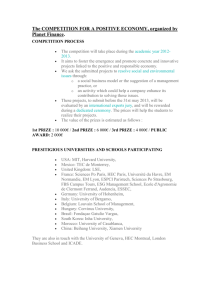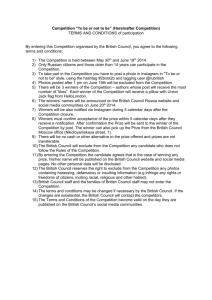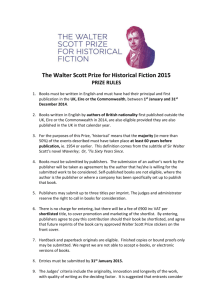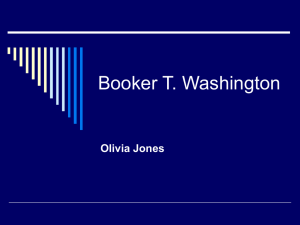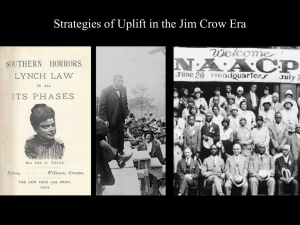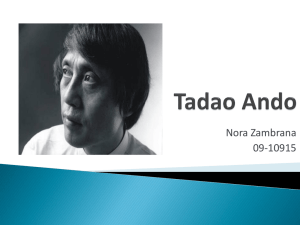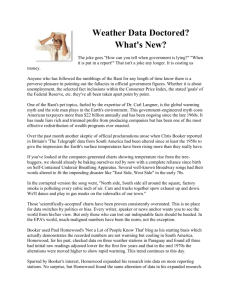Reading Groups and Events
advertisement
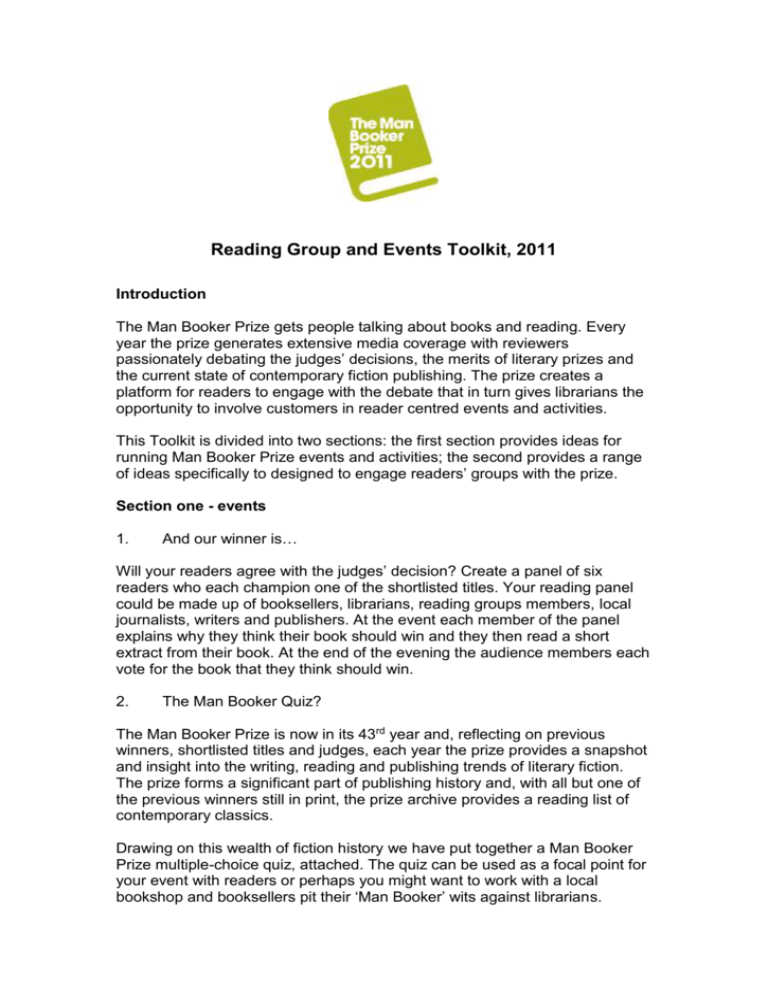
Reading Group and Events Toolkit, 2011 Introduction The Man Booker Prize gets people talking about books and reading. Every year the prize generates extensive media coverage with reviewers passionately debating the judges’ decisions, the merits of literary prizes and the current state of contemporary fiction publishing. The prize creates a platform for readers to engage with the debate that in turn gives librarians the opportunity to involve customers in reader centred events and activities. This Toolkit is divided into two sections: the first section provides ideas for running Man Booker Prize events and activities; the second provides a range of ideas specifically to designed to engage readers’ groups with the prize. Section one - events 1. And our winner is… Will your readers agree with the judges’ decision? Create a panel of six readers who each champion one of the shortlisted titles. Your reading panel could be made up of booksellers, librarians, reading groups members, local journalists, writers and publishers. At the event each member of the panel explains why they think their book should win and they then read a short extract from their book. At the end of the evening the audience members each vote for the book that they think should win. 2. The Man Booker Quiz? The Man Booker Prize is now in its 43rd year and, reflecting on previous winners, shortlisted titles and judges, each year the prize provides a snapshot and insight into the writing, reading and publishing trends of literary fiction. The prize forms a significant part of publishing history and, with all but one of the previous winners still in print, the prize archive provides a reading list of contemporary classics. Drawing on this wealth of fiction history we have put together a Man Booker Prize multiple-choice quiz, attached. The quiz can be used as a focal point for your event with readers or perhaps you might want to work with a local bookshop and booksellers pit their ‘Man Booker’ wits against librarians. 3. Readers Days Readers’ Days are becomingly an increasingly popular way to stimulate reader-to-reader activity. A typical Readers Day would involve a range of reader centred activities designed to get people discussing and sharing their reading experiences. The Man Booker Prize provides an ideal focus and theme for a Readers Day. The following offers a range of different ideas for workshops and sessions that could help to form and shape a library Man Booker Prize Readers’ Day. Invite authors, booksellers, librarians and/or readers to share their Man Booker reading history: which Man Booker Prize winner would you recommend to another reader; which book should never have won the prize and which book was overlooked; which books have influenced your future reading and which are long forgotten. Invite the audience to participate in the Man Booker Prize Quiz (see point 2 above) and perhaps offer the current winning title as a prize. Debate and select the participants’ Booker of Bookers Breakout sessions during the day could include: 4. exploring the impact of first paragraphs of Man Booker Prize winning titles looking at the different narrative styles of winning titles – unreliable narrators, first and second person narration; books with a number of narrative voices etc. discussing winning titles that share a particular theme such as loss, identity, duty etc. Online debate The Man Booker Prize website (www.themanbookerprize.com) hosts a lively debate section where readers from around the world share their thoughts on individual titles, the judges’ decisions and make predictions for the longlist, shortlist and winner. The Man Booker Prize debate section is the ideal forum for readers that enjoy book blogging and creating online reading diaries and reviews. Encourage your readers to join the debate; everyone is welcome. Section two – reading groups Feedback from reading groups that have been involved with previous Man Booker Prizes tells us that not only did their members really enjoy the experience but it also helped them to develop as a group and be more experimental with their reading choices. “Without a doubt. It has increased the members and they feel the group has a purpose and drive now. It has also made all members closer, the discussion needs less prompting from me”. “Contributing to the web forum made us feel part of the bigger picture – almost like being members of a national Reading Group. Everyone really enjoyed trying to predict the winner and reading about other groups (and individual’s) choices and the reasons behind them”. “It has been a great stimulus to us – a real shot in the arm. We feel invigorated and revitalised. It has helped to cement the group together and brought some new members rapidly into the centre of the group”. Here are a selection of ways in which your reading groups, or individual members of your group, can get involved with The Man Booker Prize. 1. Shadowing The Man Booker Prize Shadowing is a tried and tested way to involve reading groups with literary prizes. Shadowing involves readers from your group following the same process as the judges. Ideally your group should read all 6 shortlisted titles between the announcement of the shortlist (6th September) and the winner (18th October). The group comes together during and/or at the end of the process to discuss their winner. It is unlikely that there will be a consensus of opinion amongst your group, however for an authentic shadowing experience we recommend that the group selects only one winner - the judges usually have different views about which title they think is best but the process demands that they debate and discuss until a single winner is agreed. You may want to consider making your final Man Booker Prize a special event, perhaps by holding it on the same day the judges make their announcement (18th October), offering refreshments and inviting the local press along to cover the event. Many members of reading groups that shadow the prize enjoy contributing to the online debate section of the Man Booker Prize website. This enables them to share their views and reading experiences with readers and reading groups from across the world. Anyone can contribute to the debate you simply need to register on the Man Booker Prize website www.themanbookerprize.com To support and stimulate your groups’ discussions, Reading Guides for all the longlisted titles are available to download from the Man Booker Prize website http://www.themanbookerprize.com/perspective/readersguides. Each guide provides an introduction to the authors, their books, starting points for discussion and ideas for extended reading. 2. Reading lists If your group feels that the committing to read all six titles in a relatively short period of time is too onerous, perhaps you could consider using the Man Booker Prize shortlist or longlist as your group’s reading list for the year. The books chosen for the longlist and shortlist have been selected from over 150 new titles submitted by over 30 publishers. Each publisher is only allowed to submit a limited number of titles and therefore they have to decide which out of all the books they are publishing that year are potentially award winning literary novels. The Man Booker Prize judges read all the submitted titles, from this the longlist (13 titles) is chosen, this is then whittled down further to create the shortlist (6 titles). The final winner is then selected from the shortlist. The submission, selection and judging process is rigorous and readers can be assured that if a book makes the longlist or shortlist, it is for good reason. If your group enjoys reading the best new contemporary fiction, from both first time authors and established novelists, the Man Booker Prize longlist or shortlist is an ideal starting point. 3. Your Best of the Booker 2008 saw the 40th Anniversary of the Man Booker Prize and to celebrate there was a one-off award, The Best of the Booker, which honoured the best overall novel to have won the prize. A panel of judges selected a shortlist of six novels from the 41 previous winners: J G Farrell, The Siege of Krishnapur Nadine Gordimer, The Conservationist Salman Rushdie, Midnight’s Children Peter Carey, Oscar and Lucinda Pat Barker, The Ghost Road J M Coetzee, Disgrace The winner Midnight’s Children by Salman Rushdie was chosen by public vote. Your group may want to consider holding a special Best of the Booker event. All the previous winners are now debatably must-read classics and readers undoubtedly will have a view on many of the judges’ choices. During Your Best of the Booker reading group event you could consider discussing the shortlisted books that you feel were overlooked - the ones that should have been winners; recommend winners to other members of the group; and chose one or two of the most highly debated titles for your group to read over the forthcoming months. Key dates 26th July – Longlist announced 6th September – Shortlist announced 18th October – Winner announced
